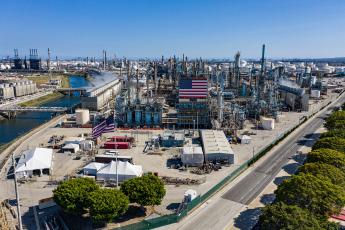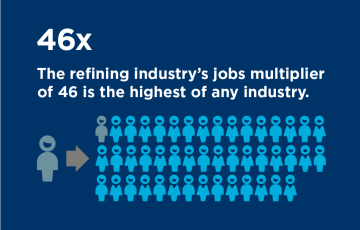Congress must vote to overturn Biden-Harris regulation banning most new gas cars
WASHINGTON, D.C. — AFPM President and CEO Chet Thompson issued the following statement ahead of this week’s Congressional Review Act resolution vote in the House of Representatives to overturn EPA’s regulations that aim to phase out most new gas-powered cars by 2032.
Do refineries set the price of gasoline?
It is a common misconception that refiners set the price of gasoline. But, in fact, refiners are price takers—not price makers.
Why California’s refinery inventory mandate is a bad idea
We get it. If supply and demand are what determine gasoline prices, you would think mandatory storage of even more gasoline in California might help to keep prices lower for consumers. But it’s not that simple. In fact, mandating that refiners keep significant volumes of gasoline in inventory ALL THE TIME is a recipe to raise everyday fuel costs in the California market and potentially reduce supplies of fuel available to Arizona and Nevada. And what’s worse, there’s no evidence that having more fuel in inventory would stop the occurrence of price jumps.
Supporting millions of jobs and contributing billions: Understanding the economic impact of U.S. refiners
The U.S. refining industry has a widespread economic impact on our nation. It supports millions of American jobs and pumps billions of dollars into the economy, as documented by the new AFPM report Economic Contributions of U.S. Petroleum Refineries. Report highlights, based on the latest full year of data available through IMPLAN (2022), are featured in this blog.
Illegal refinery mandate a sure way to increase California fuel costs
WASHINGTON, D.C. — Chet Thompson, President and CEO of the American Fuel & Petrochemical Manufacturers (AFPM), issued the following statement on California Senate Bill 950, legislation which authorizes the California Energy Commission (CEC) to impose a new mandate on state fuel refiners.
CA minimum inventory proposal a costly misdiagnosis for state’s fuel supply challenge
WASHINGTON, D.C. — The American Fuel & Petrochemical Manufacturers issued the following statement from Chief Industry Analyst Susan Grissom on Governor Gavin Newsom’s call for legislation that will impose a new, costly mandate on California refiners.
AFPM launches new ad ‘Driver’s Seat’ showcasing VP Harris’ support for a national ban on new gas cars
WASHINGTON, D.C. — Today, the American Fuel & Petrochemical Manufacturers (AFPM) is launching Driver’s Seat, a new issue ad highlighting Vice President Kamala Harris’ well-documented support for a California-style 100% ban on sales of new gas cars across the United States, policy that is even more extreme than the unpopular Biden-Harris EPA regulation aimed at phasing out most new gas cars by 2032.
What goes into the price of gasoline?
Every day, U.S. consumers purchase more than 350 million gallons of gasoline to get to work and school, to go on vacation and to see family. But what goes into the price we pay for gasoline?
AFPM: U.S. government flip-flop in support of plastic production caps threatens years of UN negotiating work
WASHINGTON, D.C. — American Fuel & Petrochemical Manufacturers (AFPM) President and CEO Chet Thompson issued the following statement today in response to reports indicating that the United States is shifting its position on the United Nations’ global agreement to end plastic pollution and will now support calls for plastic production caps and the establishment of a global list of banned chemicals. AFPM has been a participant in the United Nations’ (UN) Intergovernmental Negotiating Committee (INC) process for the past two years:









